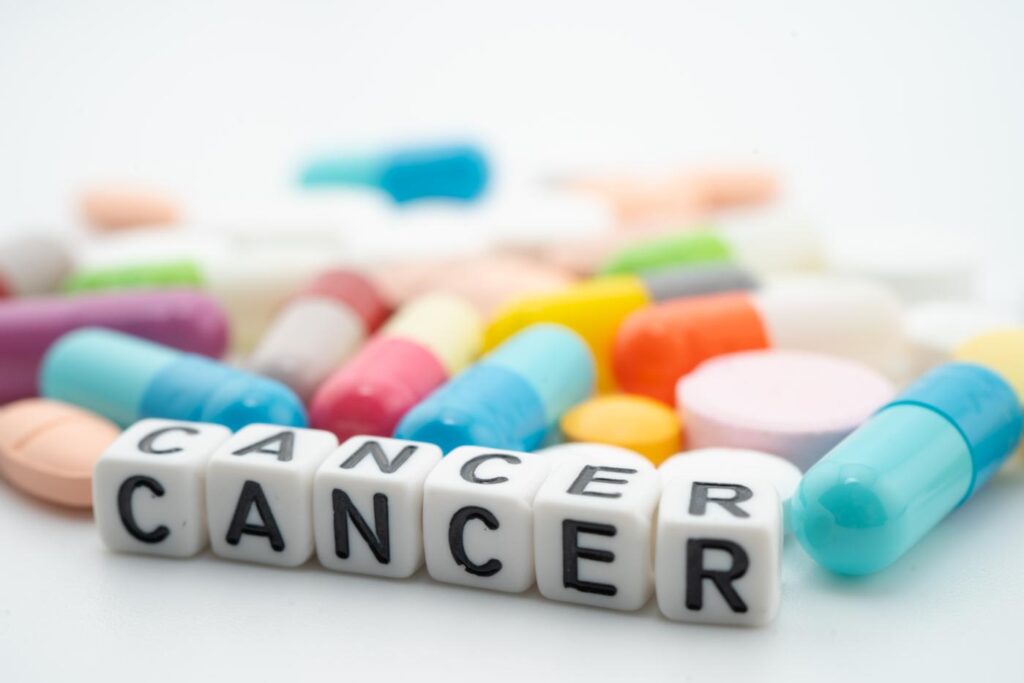How Cancer Patients Can Boost Immune Nutrition: A Complete Diet & Lifestyle Guide
Nine nutrition and lifestyle strategies to help cancer patients boost immunity and reduce side effects.
Free cancer support
Why Is Immune Nutrition Important?
Since its introduction in 2016, immunotherapy has been widely applied in many cancers (National Cancer Institute, 2022). However, its effectiveness depends on the number and activity of immune cells. Adequate nutrition = stronger immune cells, enabling treatment to work at its best (ESPEN, 2021).
Good nutrition helps cancer patients reduce side effects, fight inflammation, and maintain immune defense. Below are nine key strategies to strengthen immunity during treatment and recovery.

Strategy 1: Prioritize High-Quality Protein
Protein is the building block of immune cells. During treatment, patients need 1.2–1.5 g/kg body weight per day, equivalent to 9–13 protein servings.
- Animal protein: salmon, mackerel, tuna (rich in Omega-3), shellfish (zinc & iron), lean meats, chicken, eggs, low-fat dairy.
- Plant protein: beans, tofu, nuts (also rich in vitamin E for antibody production).
A zinc deficiency is strongly linked to weakened immunity (Hu et al., 2022).

Strategy 2: Eat at Least One Bowl of Whole Grains Daily
Whole grains such as oats, brown rice, and wholemeal bread provide B vitamins (B2, B5, B6, folate), essential for cell repair and antibody production (ESPEN, 2021; Hopkins Medicine, 2023). Refined carbs like white rice and noodles lack these nutrients.

Strategy 3: Eat the Rainbow (Fruits & Vegetables)
Aim for 3 types of vegetables and 2 types of fruits daily:
- Green: leafy greens (vitamins A, C, E to support T-cell function).
- Red/Orange: carrots, pumpkin, tomatoes (β-carotene → vitamin A for immunity).
- Mushrooms/Black foods: shiitake, maitake, rich in polysaccharides to activate macrophages and NK cells (Lee et al., 2021).
- Vitamin C-rich fruits: guava, kiwi, papaya, strawberries to boost interferon and immune defense (Mukai et al., 2021).

Strategy 4: Probiotics and Gut Health
The gut microbiome plays a vital role in immune response and immunotherapy effectiveness (Hu et al., 2022).
- Recommendation: a yogurt or probiotic supplement daily, plus high-fiber vegetables.
- Studies show probiotics increase NK and T-cell activity and reduce chemotherapy-related diarrhea (Mukai et al., 2021).

Strategy 5: Control Fat Intake
Too much fat can suppress immune function.
- Daily intake: men 55–66g, women 45–55g (Hopkins Medicine, 2023).
- Healthy fats: olive oil, flaxseed oil (monounsaturated & Omega-3).
- Avoid excess Omega-6: corn oil, soybean oil, sunflower oil, which promote inflammation.

Strategy 6: Reduce Sugar & Refined Carbs
Excess sugar weakens white blood cell function. A study found that 100g sugar reduced immune activity by over 50% (Verywell Health, 2023a). Swap sugary drinks with green tea, herbal tea, or plain water.

Strategy 7: Key Immune Nutrients (D3, Curcumin, Polysaccharides)
- Vitamin D3: regulates immunity and reduces inflammation.
- Curcumin: lowers harmful immune activity (Treg) while boosting cytotoxic T-cell function.
- β-Glucans (from medicinal mushrooms, yeast): shown in clinical studies to stimulate NK and T-cell activity (Hu et al., 2022).

Strategy 8: Immune Nutrition Formulas
Oncology-specific formulas (containing fish oil, arginine, nucleotides, glutamine) can reduce inflammation, strengthen immune response, and improve treatment tolerance—especially around surgery and chemo/radiotherapy (Schmidt & Oberritter, 2024).

Strategy 9: Moderate Exercise
Regular physical activity reduces chronic inflammation, increases NK cell activity, and enhances immune response. Studies show that combining diet and exercise creates a synergistic effect on immunity and survival (Demark-Wahnefried & Thomson, 2025).

Conclusion
Immune nutrition is crucial for cancer care. By combining protein, whole grains, colorful fruits and vegetables, probiotics, healthy fats, immune-support formulas, and moderate exercise, cancer patients can strengthen immunity, reduce treatment side effects, and improve long-term outcomes.

Contact our professional team now
References
- Hu, et al. (2022). Nutrition and immunity in cancer patients. Frontiers in Nutrition.
- Lee, et al. (2021). Mushroom polysaccharides and immune modulation. International Journal of Medicinal Mushrooms.
- Mukai, et al. (2021). The role of vitamins and nutraceuticals in cancer immunity. Nutrients.
- Schmidt, J., & Oberritter, H. (2024). ESPEN guidelines on nutrition in oncology. Clinical Nutrition.
- Demark-Wahnefried, W., & Thomson, C. A. (2025). Lifestyle and survivorship. Journal of Clinical Oncology.
- National Cancer Institute. (2022). Cancer immunotherapy and nutrition.
- Hopkins Medicine. (2023). Nutrition guidelines for immune health.
- Verywell Health. (2023a). Sugar and immune function.
